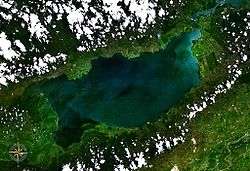Lake Izabal
Lake Izabal (Spanish pronunciation: [isaˈβal]), also known as the Golfo Dulce, is the largest lake in Guatemala with a surface area of 589.6 km² (145,693 acres or 227.6 sq mi) and a maximum depth is 18 m (59 ft). The Polochic River is the largest river that drains into the lake. The lake, which is only a metre above sea level, drains into the Gulf of Honduras of the Caribbean Sea through the smaller Golfete Dulce, which is at sea level, and the navigable Rio Dulce.
| Lake Izabal | |
|---|---|
 from space | |
 Lake Izabal | |
| Coordinates | 15.5°N 89.1667°W |
| Primary inflows | Polochic River |
| Primary outflows | Río Dulce |
| Basin countries | Guatemala |
| Surface area | 589.6 km2 (227.6 sq mi)[1] |
| Max. depth | 18 m (59 ft) |
| Surface elevation | 1 m (3 ft) |
| References | [1] |
The well preserved colonial Castillo de San Felipe de Lara guarded this lake against pirate attacks, and there are some ancient sunken ships nearby. It is home to several species including the Manatee, Jaguar, Spider Monkey, Blue Eye Cichlids, and Howler Monkey, and is a popular place for birdwatching.
Culture
There are many indigenous communities surrounding the lake, namely the Mayas Q'eqchi'. The fish in the lake are a major source of nutrition in these people's diet. An aquatic plant known as Hydrilla, which has both positive and negative effects on the ecosystem, has been shown to nourish the existing fish species.[2]
The Castle of San Felipe de Lara: This castle, constructed in 1652 in honor of Judge Antonio Lara Mangravo, was built to protect the region from pirates. The castle is equipped with cannons and a sturdy framework throughout.
Controversy
Surrounding Lake Izabal are mountains that contain an abundance of nickel. Although nickel mines have been a source of environmental contamination in other countries, the government of Guatemala has granted licenses for nickel exploitation. As in other countries, this endeavor could pollute the lake resulting in environmental degradation, economic repercussions, and a potential decline in tourism. In a similar yet ironic way, the giant grebe bird (known as "poc" in Mayan) that used to live around Lake Atitlán, a lake that lies approximately 209 km (130 mi) away, is now extinct due to the creation of a resort[3], demonstrating the potential consequences of mining for Lake Izabal.
Among the many companies that are involved in this business are the Guatemalan Nickel Company, a foreign private multinational company, and Skye Resources, a Canadian business. Another Canadian mining company, the Anfield Nickel Corporation, was granted a 25-year mining license to extract 100% of the nickel they find in the designated area[4]. Through one way or another these two companies have gained possession of the mining territory for 120 USD per square kilometer. Additionally, they, and other foreign mining companies, have only needed to pay Guatemala a mere 1% in taxes of what they retrieve; this has raised suspicions about whether these mining companies have used bribes to obtain such generous transactions.
References
- INSIVUMEH. "Indice de lagos". Retrieved 13 July 2008.
- Barrientos, C.A.; Allen, M.S. (2008). "Fish abundance and community composition in native and non-native plants following hydrilla colonisation at Lake Izabal, Guatemala". Fisheries Management and Ecology. 15 (2): 99–106. doi:10.1111/j.1365-2400.2007.00588.x.
- LaBastille, Anne (1990). Mama Poc. New York: W.W. Norton. ISBN 0393028305.
- Marketwire (9 July 2013). "Anfield Is Granted the Sechol Exploitation License for the Mayaniquel Nickel Project, Guatemala". Newspaper Source Plus. Retrieved 21 February 2019.
External links
- Instituto Nacional de Sismología, Vulcanología, Meteorología e Hidrolagía (INSIVUMEH)
- Lakes in Guatemala Photo gallery
- Lake description (in Spanish)
- Guatemalan Fauna Photo gallery